HIT CHANNEL EXCLUSIVE INTERVIEW: January 2024. We had the great honour to talk with a legendary fretless bass player and a true gentleman: Percy Jones. He is most known a founding member of Brand X (featuring Phil Collins of Genesis). His current band, PAKT featuring Percy Jones, Alex Skolnick, Kenny Grohowski and Tim Motzer are releasing their new album “No Steps Left To Trace” (Moonjune Records) on 1st March 2024. He is also currently a member of MJ12 and has played with Soft Machine, The Liverpool Scene, Brian Eno, Steve Hackett and David Sylvian. Read below the very interesting things he told us:
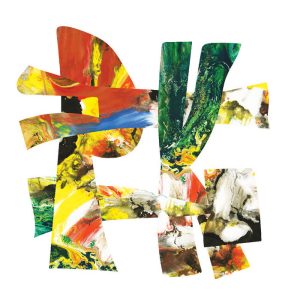 How did you decide to form PAKT with Alex Skolnick (Testament, Savatage -guitar), Tim Motzer (guitar, electronics, production) and Kenny Grohowski (John Zorn -drums)?
How did you decide to form PAKT with Alex Skolnick (Testament, Savatage -guitar), Tim Motzer (guitar, electronics, production) and Kenny Grohowski (John Zorn -drums)?
It was actually a suggestion by Leonardo Pavkovic (ed: Moonjune Records owner). I played with Kenny in the last version of Brand X. We retired the band when John Goodsall (guitar) passed away (ed: in 2021) and I wanted to continue working with Kenny. Anyway, Leonardo suggested an improv band with myself, Kenny, Alex and Tim. We did one gig at ShapeShifter Lab in Brooklyn. That was the first gig and that gig went quite well, so we started doing more and it’s been getting a good reception and we are keeping adding. We have some gigs on the West Coast coming up in February, in just over a week.
You recorded “No Steps Left Τo Trace” live in one day at NRS Studio in the Catskill Mountains. Why did you prefer this particular way of recording?
We had already recorded some live gigs and put them out for streaming, but we wanted to do a studio recording where you have actually got more control over the process. So, we spent a day at Scott Petito’s studio up in Upstate, in the Catskills. We spent a day there, again improvising and put down a bunch of stuff and that record will be out soon (ed: on 1st March). We used that studio because Leonardo had used it before with some of the bands that he works with. The studio had a good reputation and, you know, wasn’t too expensive. So, that’s why we used that studio and I liked it. It’s a nice studio, actually.
I really like the interaction between the bass and the guitar in “Spontaneous Combustion” after 7 minutes. How did this track come about?
Actually, off the top of my head, I can’t really remember which track is. I would have to listen to it again, because I’m not sure. I don’t have the record here. I was in a listening party recently where they played the whole thing, but I can’t remember which track is. It was all improv and we make a big effort to really listen to each other and play off of each other. So, Tim or Alex, they might play something and I will react to it or I might play a line and they will react to what I am doing. There is a lot of interplay like that which is actually very important, to keep the music moving. But sorry, I have to listen to the record to remember how that specific track, “Spontaneous Combustion”, sounded.
Did you improvise in the studio with PAKT as you do in your concerts?
Yes, it’s exactly the same process. The engineer would start recording and we would just start improvising. It was the same process as doing a live gig. One interesting thing about PAKT is that it sounds different every time. There is very little repetition, so the music that came up in the studio was unlike anything we had done on gigs.
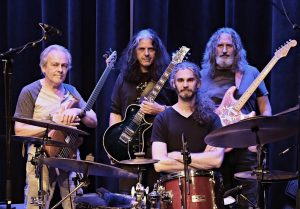 How much does it affect your playing the fact that there are two guitarists in the line up?
How much does it affect your playing the fact that there are two guitarists in the line up?
I have to listen, I have to be very vigilant and pay attention to what they are both playing. For example, sometimes it doesn’t need any bass and I would just stop and listen. A band like that I don’t feel that I have to be playing all the time. Sometimes, whatever is going on in a moment sounds just fine with no bass at all. Sometimes, I stop playing the bass and I work with the sampler and play some samples, if I think a certain sample is the appropriate on what’s going on in the moment. We never know what’s coming next and I found that the best way to approach a gig with PAKT is to go into the gig without any plan, without any preconception of what we are gonna do. So, go completely mentally cold and just let the music evolve.
What should fans expect from the upcoming PAKT tour?
I think they are gonna expect the same approach that we are using on the record. It isn’t going to sound the same, but the approach to the music will be the same. We have never played on the West Coast before, so it’s a new experience. I don’t really know what to expect (laughs). We will go over there and play and hope for the best.
What are the latest news from your other band MJ12?
That band started several years ago, probably 12 years ago or something. Originally, it was myself and Stephen Moses, the drummer and Stephen and I had played together years ago in New York in the ‘80s, in a band called Noise R Us, so we already had a rapport together. We started out playing at dive bars mostly in Brooklyn and we would invite guests to come and play. We invited guitar players, horn players, a cello player and on one occasion there was a guy playing an amplified bicycle wheel (laughs). So, we kept that up for some time and again that was all improvisation and it got to the point where I suggested to Stephen that maybe we should do some written material. So, between the two of us, we wrote some material and we made the band more permanent. We got Chris Bacas on saxophone and David Phelps on guitar and both of those guys had sat in with us previously, as guests, so we knew how they played. The band became a permanent line up and we have done one record which is on Gonzo Multimedia (ed: “MJ12” -2016). It’s actually time for another one. I have to write more material because we need to do a new record soon. It’s a band I enjoy playing with a lot. I think they are good musicians.
Are you proud that Brand X’s “Unorthodox Behaviour” (1976) is considered a classic album?
Yes, actually “Unorthodox Behaviour” was the very first Brand X record and it was turned down by Island Records and eventually it came out on Charisma. I mean, I like aspects of all the records, they are all different, but I know from talking to people that “Unorthodox Behaviour” is one of their favourites; a lot of people prefer that specific record. But it was our first record and we tried to break some ground with that, which I think we succeeded. So yeah, I ‘m proud of it. I’m happy with it.
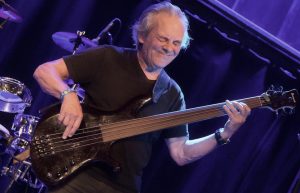 Could you describe to us the chemistry you had with Phil Collins (drums) as rhythm section in Brand X?
Could you describe to us the chemistry you had with Phil Collins (drums) as rhythm section in Brand X?
The original drummer was John Dillon and we started out playing funk music with vocals and there were other members: Pete Bonas (guitar), Phil Spinelli (vocals, percussion) and John Dillon. After a while, we decided we wanted to play more instrumental music because we were hearing what Miles Davis and others were doing in the States. We decided we wanted to do something more like that, a fusion of jazz and rock and so on. It wouldn’t work with the original drummer statistically, so we started looking for another drummer. We asked Bill Bruford (Yes, King Crimson) and Bill came down and played and we offered him the gig and he turned it down and then an A&R man at Island Records, Danny Wilding, suggested the guy from Genesis, Phil Collins. At the time, I wasn’t very familiar with Genesis. You know, I had heard them but I didn’t know much about the music. So, Phil came down and played and we all liked his playing and he liked the band. So, we offered him the gig and he joined. He was actually the last person to join Brand X. The chemistry with him was good because we could relate to each other and then we also played on a lot of sessions together as a rhythm section: We did stuff with Brian Eno, Nova, the Italian Band, some concept albums, we did quite a bit of work the two of us as a rhythm section, outside of Brand X. He was a very good drummer, actually. I enjoyed playing with him.
Why did Brand X never get paid any royalties for their recordings?
By 1980 the management started complaining that we were not selling enough records, that we needed to make the music more accessible to the public. I rebelled against that; I felt that if we tried to pander to a section of public that wanted more commercial music, we would probably just lose the fans that we already had, so I rebelled and tried to stick with what we were doing. So, it ended up in two different line-ups both playing on the same record (laughs). At that point, the management claimed that we were in debt and apparently the debt was very-very large, but the problem was there was no accounting, there was no paperwork to explain to debt: Who the money was owed to or anything. So, at that point, I think in 1981, the band broke up. We stopped working and the management who also had a publishing company started recouping all the royalties to pay off the debt and that has been going on for 40 years. So, that’s why we don’t see any royalties. Again, we had more problems: More recently, between 2016 and 2019, the two guys who were managing us for those three years were not accounting. So, the band has a history of just really bad finances going on. Mostly, just a lack of accounting. You don’t know where the money is going, you don’t know who is getting what. It’s just very uncomfortable. The two guys managing us recently essentially are trying to steal the band, to steal the name. The one guy, he’s still on Facebook under “Official Brand X”, acting like he’s Brand X. Very strange behavior. The band has been retired for the last two years. Robin Lumley (keyboards) and myself retired the band when John died (ed: Goodsall -guitar -died in 2021) and then Robin Lumley died more recently (ed: in 2023). There is no band. So, that guy shouldn’t be on Facebook now representing Brand X. It’s quite a crazy situation. So, we’ve done this: We have created a Facebook page called “The Band Brand X” and the reason for doing that is to try and protect the legacy of the band, because we don’t want to see another band called Brand X coming along in the future, which has nothing do with any original band member.
Why Island Records never released the first Brand X album which had vocals on?
Robin Lumley (keyboards) had a tape at his house, which was part of the original Brand X recording that we did for Island Records, with the original line up, which as we were saying earlier was John Dillon (drums), Pete Bonas (guitar) and Phil Spinelli (vocals, percussion) and it was kind of funk with vocals. Robin had a two-track reel-to-reel of some of that material. So, at some point we will probably release it and we might have to clean it up a little bit to master it. Some of Brand X fans might be interested to hear that. That’s something we are planning on in the future.
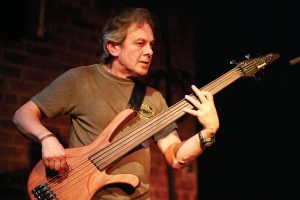 Did you enjoy the Brand X performance at Knebworth Festival in 1978 with Genesis, Jefferson Starship and Tom Petty?
Did you enjoy the Brand X performance at Knebworth Festival in 1978 with Genesis, Jefferson Starship and Tom Petty?
Yeah, I remember playing at Knebworth. I can’t remember how it sounded. I remember someone wrote a review in the Melody Maker -Melody Maker was a British music publication- and he described Brand X as sounding like “pebbles on a tin roof” (laughs). It wasn’t a very good review. It’s not a very flattering comment. We also did a gig with Starship in Germany and there was a riot because apparently Grace Slick (ed: Jefferson Airplane, Jefferson Starship -vocals) was drunk or something. So, they didn’t play and the fans rioted, burned the stage and burned all the equipment (laughs). Those were so crazy days.
In 1979-1980 there were two different Brand X line ups at the same time. What really happened?
Like I explained earlier, we started coming under pressure to make the music more commercial and I disagreed with that, so I just wanted to keep doing that we were doing and trying to push boundaries. Some of the other guys went along with the suggestion and started writing more commercial music with vocals. So, the only solution was to have two line ups. The line up for my stuff was: myself, Mike Clark (drums), Peter Robinson (keyboards) and the other line up was: Phil (ed: Collins -drums, vocals), John Giblin (ed: Peter Gabriel, Kate Bush, Scott Walker -bass) and Robin Lumley (keyboards). And John (ed: Goodsall -guitar) played on both (laughs). On those two records (ed: 1979’s“Product” and 1980’s “Do They Hurt?”) you got these two different line ups. So, the music is rather schizophrenic. You got two different directions. At the time, was the only solution. The other guys were doing more commercial stuff, things like “Soho” with vocals Phil sang. In retrospect, I don’t think it got the band a bigger audience at all.
Have you ever thought how much different the story of Brand X would have been if they had a full-time drummer?
Yeah, it was a constant problem with Phil because he was most of the time busy with Genesis. So, Brand X would have tours, especially American tours, that Phil couldn’t do. So, we had no choice but to use other drummers if we wanted to keep playing and everybody wanted to play. I remember calling Alphonso Johnson (ed: Weather Report -bass) in LA and asked him: “We are looking for a drummer, do you know anybody over there you think he would fit with Brand X?” and he said: “Yeah, there is a guy in New York, Kenwood Dennard, you should check him out”. So, I did and I liked his playing a lot. So, Kenwood joined the band at that point. I think it was in 1977. Then, after Kenwood, Chuck Burgi (ed: Rainbow, Blue Oyster Cult, Billy Joel) did it for a while and then finally, Mike Clark, who previously played with Herbie Hancock. Kenwood and Mike both were very-very good drummers. I mean, different feel but nevertheless they were both technically very good drummers. The band was lucky to have good drummers playing in the band.
Do you miss John Goodsall (Brand X -guitar, died in 2021)?
Yes, he was a character. A very funny guy but pretty wild. He had a very wild lifestyle. He was a great guitar player and a great composer as well. He wrote some very good material. There is nobody like him. Yeah, we miss him.
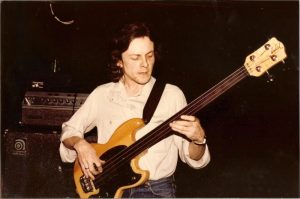 What’s so special about the fretless bass?
What’s so special about the fretless bass?
I started out playing a fretted bass, but I was mostly listening to upright players: Charles Mingus was a very big influence. There were a lot of upright players that I liked, but Mingus was a favourite, you know. So, when I had a fretted bass I was experimenting with it. It was an old Gretsch, semi-acoustic bass with an extra long scale, so I filed down the frets under the top string (ed: G). I put accelerometers on it to pick up the wood vibration (laughs). So, it was almost a hybrid fretted/fretless bass. Then, in 1974 I saw an advert and a guy was selling a Fender Precision fretless for £200 and I ‘ve just got my publishing advance, which was £200. So, I went up to the guy’s house in North London and took a look at the bass; it was in a very good condition, so I bought it, not knowing if I would be able to play it. I took it home and started playing it and I immediately liked it. I found that I could express myself a lot more than I could with a fretted bass. I started working hard on it, working on intonation and technique and so on and six weeks after buying the bass we recorded “Unorthodox Behaviour”. So, that was one of the first records that I used a fretless bass on and I stayed with the fretless ever since.
How much has your approach to bass changed over the years?
That’s a difficult question to answer. I think it has developed. I ‘ve discovered new techniques that I can use. I like the bass to sound expressive, to try and make the bass sound animated, so to speak. To make it sound like a bass usually doesn’t sound. So, I put a lot of attention into that and then technique is always a challenge. Even now, I am still constantly trying to improve technique, so that if I hear something in my head, I can physically play it. In 1977, I switched from playing a Fender to Wal, so the sound changed a little bit. I ‘ve since experimented with an Ibanez bass with just Piezo pickups and no magnetic pickup. Yes, I guess the sound has changed over the years somewhat, but nobody wants to keep playing the same stuff forever. I am just trying to develop as a musician.
I love your fretless bass playing on “Over Fire Island” song from Brian Eno’s “Another Green World” album (1975). Would you like to tell us a few words about this song?
That came about because the Brand X guys had played on a concept album called: “Peter and the Wolf” (1975) that Robin Lumley and Jack Lancaster (ed: Blodwyn Pig -flute, saxophone, violin) put together. It was the original Prokofiev score but played by rock guys and they invited guys to come and play on the record. I remember Jon Hiseman (ed: Colosseum -drums), Bill Bruford, Gary Moore and Brian Eno was one of the guests. He apparently liked the rhythm section. He asked: “Who’s the rhythm section on this stuff?” and they told him: “It’s Phil and Percy”. So, he asked Phil and I to go and record with him. We went in to Island Studios, West London and we put down some tracks with Eno. It was very enjoyable because the guy, in my opinion, was so unusual in his approach, because the music was so open. I mean, it was really borderline improvising. Eno would come up with a very simple, basic idea and then he would just let everybody run with it. I think by using that approach he got the best performances out of the musicians, because he let you be yourself. He wouldn’t tell you: “Play a 16th note here”. There was no detail. He would let you play and then he would give you some guidance like, for example, he would say: “Take those two bars and loop them for a little bit”, suggestions like that. I remember “Another Green World” because when he had finished the record he sent me a copy, a vinyl, in a mail and I played at home and I thought: “Wow, this is really good stuff! He’s just done such a good job with everything”. Yes, I have good memories working with him.
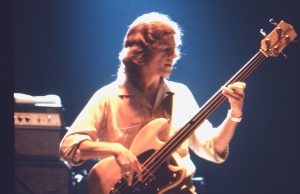 Your performance on “Kurt’s Rejoinder” from Brian Eno’s “Before and After Science” (1977) is fantastic. In the credits I read that you played analog delay bass. Why didn’t you use a fretless one?
Your performance on “Kurt’s Rejoinder” from Brian Eno’s “Before and After Science” (1977) is fantastic. In the credits I read that you played analog delay bass. Why didn’t you use a fretless one?
Thank you. Back then, I used to build my own effects and I think what he was referring to was: I built a flanger which was analog. The delay line was not digital. It used an early Fairchild analog charge coupled shift register chip, one of the first that came on the market, actually. You could set it so that the delay time went up to about 25 ms (milliseconds), it was proportional to the input frequency. So, if you play a low note, like an open E, the delay time would go up to 25ms. If you play high notes, the delay would be shorter, maybe 3-5 ms. So, it made it much more musical and I got a lot of use out of it back in those days. I think that’s what Eno was referring to when he said: “Analog delay bass”. Are you familiar with the tune “R.A.F.” (ed: it means: “Rote Armee Fraktion”, the West German urban guerrilla group -the song is not included in “Before and After Science” album) that Eno did? He put out a single and I think the A-side was “King’s Lead Hat”, which I didn’t play on and the B-side was called “R.A.F.” and Paul Rudolph (ed: Pink Fairies, Hawkwind) who was the other bass player on some of the sessions had this auto-wah built into a tobacco tin and it sounded fantastic. I said: “Can I borrow it for this track?”, so I tracked “R.A.F” with Paul’s tobacco tin and it was such a great sound and homemade. Someone must have built it for him, it was DIY.
Were you surprised with Brian Eno’s unconventional tactics in the studio?
Yeah (laughs). I remember showing up the one day and I walked into the control room and he said: “Watch your head!”, so I looked up and there was a tape loop going all the way around the room. They had stuck pencils in the corners of the room to guide the tape, so the tape loop must have been -I don’t know- 30 metres or something long, going around the room. So, I felt that was pretty wild. Another time, he gave everybody a piece of paper and he said: “Write down 1 to 100. On #1 Fred (ed: Frith =Henry Cow guitarist) you play F sharp. On #2 Percy you play A flat. On #3 Phil you hit something” and then we started to play this crazy arrangement. We got to #11 and it just fell apart (laughs). So, some of these ideas didn’t work at all. But it was very adventurous with his approach and some of it was great, some it really worked. I also did quite a few tracks with him, playing electric bass and upright bass, some of which I think he might have used on “Music for Films” (1978), but probably a lot of it was never used, I don’t know.
Were you frustrated when some people were saying that you were a Jaco rip-off?
Yes, I was quite disappointed because I’ve tried all my life to have my own sound and style, so when you are accused of ripping off somebody else is very disappointing. I thought Jaco was a great bass player and I love his stuff. Also, his son, Felix, is excellent bass player. Yeah, that’s was difficult to deal with.
Why don’t you consider yourself a jazz musician?
Yeah, I really don’t consider myself anything. I don’t claim to be a rock player or a jazz player or anything. I mean, I am listening to so many styles of music: I can listen to MC Lyte doing rap, I can listen to John Coltrane, I listen to North African, Indian music, Spanish, flamenco, all sorts of stuff. I like it all. I take something from all. I found that if you play, for example, Brand X music to a hardcore jazz musician, he’ll say: “That’s rock”. If you play it to a rock guy he ‘ll say: “That’s jazz” (laughs). So, just don’t you bother trying to categorize it. I just say: “It is what it is”, you either like it or you don’t like it.
 How important was it for you to meet Charles Mingus at Ungano’s Club in New York in 1969?
How important was it for you to meet Charles Mingus at Ungano’s Club in New York in 1969?
That’s right, yeah! At the time I was playing with The Liverpool Scene and we had a tour in the States, in late ’69, there was a club in the Upper West Side in New York called Ungano’s, which is not there anymore. It was a gig for the press, so we played and I was already a fan of Mingus, I was familiar with his work and some of the other guys in the band were also Mingus fans. After we played, they had a table set up with food and drinks for the press people and I looked over at the table and I see Charles Mingus there filling up his plate with food (laughs). So, we got talking to him, especially myself and the saxophone player, Mike Evans, we were both really big Mingus fans. We spoke with him and he was quite friendly. He said: “I am playing at the Village Vanguard on Thursday, why don’t you guys come down”. So, we went down to the Vanguard and there were not many people there, at all, so we got to sit just a foot away from the band. That was a big thrill to see Mingus and his band playing close up like that. Then, several days later I went into a bar on Great John Street and he was sitting at the table with his wife, so when I sat down, he was very friendly, you know. I asked him for bass lessons, but he said: “What do you play, electric bass?” I said: “Yeah” and he said: “No, I can’t teach electric bass”. He politely turned me down.
What was it like to open for Led Zeppelin with The Liverpool Scene?
It was good, it was a nice tour. It was just in the UK and I can’t remember how many dates they were. The Liverpool Scene opened and then it was Blodwyn Pig and then Zeppelin was the headliner. That was the first time I ever heard them and the last gig was at the Albert Hall. At the very end, everybody got up and jammed at the end of the gig. Yeah, those were good times.
What was it like to jam with Jimmy Page and John Bonham?
(Laughs) It was kind of crazy. There were so many people playing at once. It was a bit of a mess, but the spirit was there. It was fun. We were just jamming.
When you moved to New York you had to work at a furniture moving company. Did you have trouble being accepted into the New York music scene?
The timing was difficult. Right after I moved to New York, I got a call from the Brand X management saying that they were dropping me and not gonna manage the band anymore. I actually thought that we had a tour coming up, a US tour, so I suddenly had no income and my son had just been born, so I had a lot of responsibility and no income. Suddenly, it was very unexpected. So, I got a job with a moving company in Brooklyn. I just had to find some way to make some money, so I was out there moving furniture for six or seven months. Yeah, it was a hard time because I didn’t know very many people in New York at the time, but I did get a bit of good luck. I was in a supermarket in Brooklyn buying some vegetables and I guy came up and he said: “Are you Percy?” I said: “Yeah” and he said: “I’m in this band called Noise R Us and we get together on Thursday. Do you want to come along and sit in?” and I just said: “Yeah, ok”. So, I ended up playing with Noise R Us for several months and that was a fun band, actually. It was -I don’t know how to describe it- punk jazz. There was a horn section, it was a lot of fun. I enjoyed it. Gradually, things got better, but the first year was pretty rough, actually.
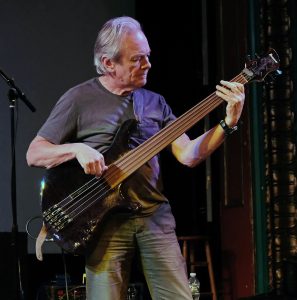 Do you have any memories from the period you played in Soft Machine?
Do you have any memories from the period you played in Soft Machine?
Yeah. That was ’77 I think and it was a period when Brand X was not doing anything. Apparently, Soft Machine were having some difficulty because, I think, Roy Babbington had recently left and they didn’t have a bass player. We (ed: Brand X) just played at Ronnie Scott’s. Apparently, John Etheridge (guitar) and John Marshall (drums) came to Ronnie’s to see the band and I guess they liked what I was doing, so they asked if I can do a tour with them, which I did and it was opening for Shakti. Most of the gigs were in Europe, in the Continent. So, we had a quick rehearsal one afternoon and then we flew to Copenhagen for the first gig. I really didn’t know the material properly at that point, because it was such a rushed rehearsal but they didn’t seem to be worried about it and it gradually came together. I think it was about a month of gigs opening for Shakti.
Was it an interesting experience to record the song the “A Tower Struck Down” from Steve Hackett’s “Voyage of the Acolyte” (1975)?
To be honest, it’s so long ago, I can’t remember what I played. I mean, if I put the record on -actually, I don’t think I have the record-, if I listen to it I will probably remember: “Oh yeah, that’s what I played”. But I think Steve called me because Phil recommended me to Steve, so that’s how I got on that record, just for one track. That was a long time ago.
Who are your influences as a bass player?
Charles Mingus, Scott LaFaro I liked a lot, I liked Miroslav Vitous (ed: Weather Report). I loved Jaco’s playing although as I said earlier I was kind of resentful when I was accused of copying him, but he was a great electric bass player. I still listen to more upright players than electric players. Niels-Henning Ørsted Pedersen was also a fantastic upright player. I like Alphonso Johnson’s playing a lot and Felix Pastorius is a very good bass player also.
I’m a huge Jack Bruce fan. Do you like him as a bass player?
Yeah, also as a singer. I like his bass playing and his singing, especially the bass playing and the singing together. It sounds fantastic.
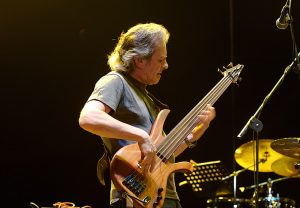 The album cover of Brand X’s “Unorthodox Behaviour” album by Storm Thorgerson (from Hipgnosis company that made album covers for Pink Floyd, Led Zeppelin, Scorpions etc.) is amazing. What was your reaction the first time you saw it?
The album cover of Brand X’s “Unorthodox Behaviour” album by Storm Thorgerson (from Hipgnosis company that made album covers for Pink Floyd, Led Zeppelin, Scorpions etc.) is amazing. What was your reaction the first time you saw it?
Well, I liked it (laughs). It’s so abstract and mysterious with a guy looking through the blinds. For years, I didn’t know who that guy was, who was looking through the blinds. People used to say to me: “Is that Phil Collins?” I said: “No”. “Who’s it? I said: “I don’t know”. I found out recently it was a guy that works at Hipgnosis. They made fantastic covers, not just Brand X covers, but for other bands. It’s great stuff.
Is listening to an album from start to finish now becoming a lost art?
Yeah, it could be. I don’t subscribe to any streaming services. I don’t use Spotify or anything. For one thing, the fidelity is not good, I mean, all the mp3’s and the compression that they use on streaming. Over the years, I think there has been generally a loss of quality sonic fidelity in music. I mean, I ‘ll go on Youtube and listen to bands that I like. I will play a video and enjoy. From what I know, streaming has not been very beneficial to the music scene.
Do you have any musical ambitions left?
Yeah. Well, I want to keep trying to be inventive. We need to do a new MJ12 record, for one thing, and I want to do a solo record, because the last one was 40-something years ago, so it’s overdue for another one. I am getting older, you know, you don’t have all the time in the world left. Those are things that I need to get started on. Yeah, I definitely want to keep doing music, trying to be innovative.
Miroslav Vitous told me that jazz is dead, jazz is finished, because there aren’t great personalities like Wayne Shorter and Herbie Hancock anymore. Do you agree with this?
Yeah, that’s an interesting point because I hear really good quality music, but conceptionally it hasn’t advanced much over last few years. You had players like John Coltrane and Miles Davis, Dizzy Gillespie, all those people that were coming up with new ideas conceptionally on how to make music and of course they were technically very skillful as well. I mean, you still have the skill but it’s lacking new concepts. I think this is also happening in rock music. I wouldn’t say it’s just jazz, I think in rock too, it’s becoming kind of stuck and a bit tired sounding, but that’s just my opinion.
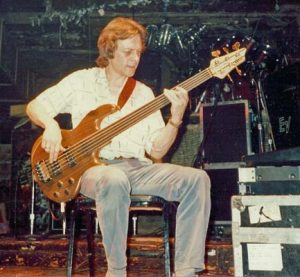 Did you like The Beatles when you were young?
Did you like The Beatles when you were young?
Oh, yeah! Well, I was in grammar school in Wales when “Love Me Do” (1962) came out and back then it sounded very-very fresh, it sounded new and it really got everybody’s attention. Yeah, I liked The Beatles and I ended up living in Liverpool from ’66 until ’72. I studied at the University of Liverpool and I worked briefly with Paul McCartney’s younger brother, Mike McCartney who was in band called Scaffold, but I never met Paul or the others.
Had you ever met John Entwistle (The Who –bass)?
No… Actually, I did. Liverpool Scene used to play a lot at a club in Birmingham called Mothers and we played there one night and after the gig The Who showed up and they had been playing somewhere else in the city, so they came in just to get a drink and I remember just saying “hello” to Entwistle, but I didn’t know him.
Did you like him as a player?
Yeah. Well, I remember “My Generation”, the bass solo (ed: he sings) : “Di-gdi-dun/ di-gdi-dun/ dun-dun”. The bass solo, yeah!
A huge “THANK YOU” to Mr. Percy Jones for his time. I should also thank Billy James and Leonardo “Moonjune” Pavkovic for their valuable help.
Official PAKT Bandcamp page: https://pakt-moonjune.bandcamp.com/
Official PAKT Facebook page: https://www.facebook.com/p/PAKT-feat-Percy-Jones-Alex-Sko- lnick-Kenny-Grohowski-Tim-Motzer-100071761532912/
Official Moonjune Records page: http://moonjune.com/
Official Brand X website: www.officialbrandx.com
Official Brand X Facebook page: https://www.facebook.com/thebandbrandx
Official Brand X Instagram page: https://www.instagram.com/thebandbrandx

